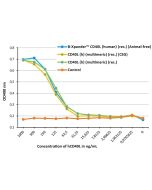Cookie Policy: This site uses cookies to improve your experience. You can find out more about our use of cookies in our Privacy Policy. By continuing to browse this site you agree to our use of cookies.
Chimerigen
CD40 (human):Fc (human) (rec.)

| Product Details | |
|---|---|
| Synonyms | Tumor Necrosis Factor Receptor Superfamily Member 5; TNFRSF5; CD40L Receptor |
| Product Type | Protein |
| Properties | |
| Source/Host | CHO cells |
| Sequence |
The extracellular domain of human CD40 (aa 21-193) is fused to the N-terminus of the Fc region of human IgG1. |
| Crossreactivity | Human |
| Biological Activity |
Measured by its binding ability in a functional ELISA assay. |
| Purity | ≥98% (SDS-PAGE) |
| Endotoxin Content | <0.06EU/μg protein (LAL test; Lonza). |
| Reconstitution |
Reconstitute with 100 µl sterile water. Add 1X PBS to the desired protein concentration. |
| Formulation | Lyophilized from 0.2μm-filtered solution in PBS. |
| Protein Negative Control | |
| Other Product Data |
NCBI reference AAH12419.1: CD40 (human) |
| Declaration | Manufactured by Chimerigen. |
| Shipping and Handling | |
| Shipping | BLUE ICE |
| Short Term Storage | +4°C |
| Long Term Storage | -20°C |
| Handling Advice |
Avoid freeze/thaw cycles. Centrifuge lyophilized vial before opening and reconstitution. |
| Use/Stability |
Stable for at least 1 year after receipt when stored at -20°C. Working aliquots are stable for up to 3 months when stored at -20°C. |
| Documents | |
| Product Specification Sheet | |
| Datasheet |
 Download PDF Download PDF |
CD40 [TNFRSF5] is a member of the TNF receptor superfamily which are single transmembrane-spanning glycoproteins and plays an essential role in mediating a broad variety of immune and inflammatory responses including T cell-dependent immunoglobulin class switching, memory B cell development, and germinal center formation. CD40 contains 4 cysteine-rich repeats in the extracellular domain and is expressed in B cells, dendritic cells, macrophages, endothelial cells and several tumor cell lines. The cognate interaction between CD40 and CD40 ligand (CD154) on T cells activates NF-κB, Jun N-terminal kinase and Janus kinase signal transducers and activators of transcription pathways. Several different TRAF proteins (adapter proteins) have been identified to serve as mediators of the signal transduction. In addition, CD40/CD40L interaction is found to be necessary for amyloid-β-induced microglial activation and thus is thought to be an early event in Alzheimer disease pathogenesis. Defects in CD40 result in hyper-IgM immunodeficiency type 3 (HIGM3), an autosomal recessive disorder characterized by the inability of B cells to undergo isotype switching, as well as an inability to mount an antibody-specific immune response and a lack of germinal center formation.







